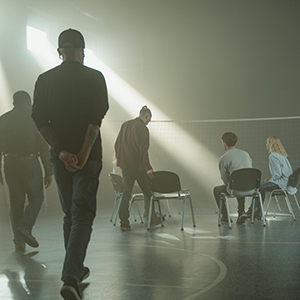Attachment insecurity predicts outcomes in an ACT-CBT group therapy for adults in a physical rehabilitation centre

Accepted: August 23, 2022
Appendix: 130
HTML: 34
All claims expressed in this article are solely those of the authors and do not necessarily represent those of their affiliated organizations, or those of the publisher, the editors and the reviewers. Any product that may be evaluated in this article or claim that may be made by its manufacturer is not guaranteed or endorsed by the publisher.
Authors
Adapting to chronic illness or disability is accompanied by acute and ongoing illness stressors. Psychological factors such as emotional distress and low self-efficacy are common experiences in chronic illness and disability and interfere with adaptation and psychosocial outcomes such as health-related quality of life. Transdiagnostic group psychotherapy may provide a parsimonious approach to psychological treatment in rehabilitation care by targeting shared illness stressors across mixed chronic illnesses and disabilities, and shared processes that maintain psychological symptoms. Attachment theory may explain individual differences in outcomes and help identify individuals at risk of poor health-related quality of life trajectories. Adults (N=109) participated in an 8-week process-based ACT-CBT psychotherapy group at a tertiary care physical rehabilitation centre between 2016 and 2020. Participants completed measures of emotional distress, self-efficacy, health-related quality of life, and attachment at pre- and post-treatment. Multilevel analyses indicated that patients improved on most outcomes at post-treatment. Attachment anxiety at pre-treatment was associated with more positive outcomes. Reliable change indices suggest clinically meaningful change for the majority of participants, but most were not recovered. Results provide proof-of-concept for the transdiagnostic group intervention and suggest that a longer course of treatment may be clinically indicated. Results warrant replication with larger and more diverse samples, and more robust designs.
How to Cite

This work is licensed under a Creative Commons Attribution-NonCommercial 4.0 International License.
PAGEPress has chosen to apply the Creative Commons Attribution NonCommercial 4.0 International License (CC BY-NC 4.0) to all manuscripts to be published.
Similar Articles
- Diego Rocco, Silvia Salcuni, Elena Antonelli, A pilot study of the Italian adaptation of the Session Evaluation Questionnaire fourth version , Research in Psychotherapy: Psychopathology, Process and Outcome: Vol. 20 No. 2 (2017)
- Giorgio Caviglia, Working on dreams, from neuroscience to psychotherapy , Research in Psychotherapy: Psychopathology, Process and Outcome: Vol. 24 No. 2 (2021): SPECIAL ISSUE "Working on dreams, from psychotherapy to neuroscience"
- Elsa Ronningstam, Mark Schechter, Benjamin Herbstman, Mark Goldbalatt, Chronic suicidal ideations: a risk or a protection , Research in Psychotherapy: Psychopathology, Process and Outcome: Online Advance Publication
- Andrea Ferrero, The Model of Sequential Brief-Adlerian Psychodynamic Psychotherapy (SB-APP): Specific Features in the Treatment of Borderline Personality Disorder , Research in Psychotherapy: Psychopathology, Process and Outcome: Vol. 15 No. 1 (2012)
- Vittorio Lingiardi, Francesco Gazzillo, Antonello Colli, Francesco De Bei, Annalisa Tanzilli, Mariagrazia Di Giuseppe, Nicola Nardelli, Chiara Caristo, Valeria Condino, Daniela Gentile, Nino Dazzi, Diagnosi e valutazione della personalit alleanza terapeutica e scambio clinico nella ricerca in psicoterapia , Research in Psychotherapy: Psychopathology, Process and Outcome: Vol. 13 No. 2 (2010)
- Gretchen Beiza, Claudia Capella, Denise Dussert, Loreto Rodrìguez, Daniela Aguila, Carolina Gutiérrez, Ximena Lama, Institutionalized adolescents in therapy: narratives of psychotherapy and healing from sexual abuse , Research in Psychotherapy: Psychopathology, Process and Outcome: Vol. 18 No. 2 (2015): Special issue on Qualitative and Quantitative Research in Child and Adolescent Psychotherapy: part 1
- Rolf Sandell, Rating the outcomes of psychotherapy or psychoanalysis using the Change After Psychotherapy (CHAP) scales. Manual and commentary , Research in Psychotherapy: Psychopathology, Process and Outcome: Vol. 18 No. 2 (2015): Special issue on Qualitative and Quantitative Research in Child and Adolescent Psychotherapy: part 1
- Jung Ki Kim, Eileen M. Crimmins, Age differences in the relationship between threatening and coping mechanisms and preventive behaviors in the time of COVID-19 in the United States: Protection Motivation Theory , Research in Psychotherapy: Psychopathology, Process and Outcome: Vol. 23 No. 3 (2020)
- Osmano Oasi, John Auerbach, Introduction to the issue in honor of Sidney Blatt , Research in Psychotherapy: Psychopathology, Process and Outcome: Vol. 20 No. 1 (2017)
- Alessandro Talia, Madeleine Miller-Bottome, Rachel Wyner, Peter Lilliengren, Jordan Bate, Patients’ Adult Attachment Interview classification and their experience of the therapeutic relationship: are they associated? , Research in Psychotherapy: Psychopathology, Process and Outcome: Vol. 22 No. 2 (2019)
<< < 13 14 15 16 17 18 19 20 21 22 > >>
You may also start an advanced similarity search for this article.

 https://doi.org/10.4081/ripppo.2022.634
https://doi.org/10.4081/ripppo.2022.634




